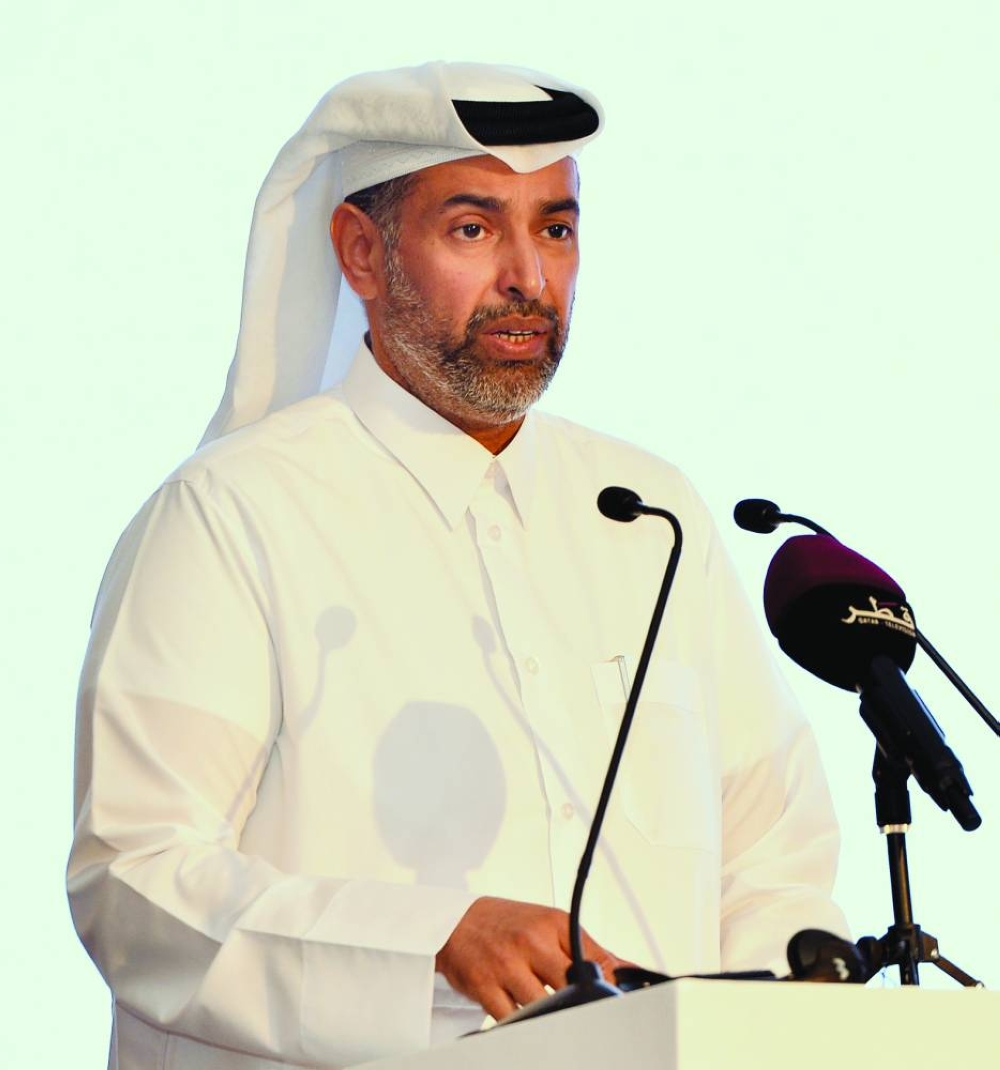
HE the Minister of Environment and Climate Change Sheikh Dr Faleh bin Nasser bin Ahmed bin Ali al-Thani delivering opening remarks at the two-day ‘Workshop on Article 6 of the Paris Agreement and Climate Finance Mechanisms’ on Tuesday. Picture: Shaji Kayamkulam
HE the Minister of Environment and Climate Change Sheikh Dr Faleh bin Nasser bin Ahmed bin Ali al-Thani has stressed the need for Qatar to ensure that it aligns with international carbon market initiatives. In his opening remarks at the two-day ‘Workshop on Article 6 of the Paris Agreement and Climate Finance Mechanisms’ on Tuesday Sheikh Dr Faleh noted, “We must build the structures and capacities needed to efficiently engage in international carbon markets to achieve this.”
A “well-functioning” framework and strategy for the implementation of a carbon market mechanism is therefore essential, he said. The minister said it is obvious that the public sector has an important role to plan in climate mitigation. “However, it is also of highest importance that we engage the private sector in the climate transition and not least ensure that they can utilise the opportunities associated with Article 6.”
Despite some progress, it is known that the world faces incredible climate change challenges. Scientists warn that a 2°C rise of warming above pre-industrial levels will be exceeded during the 21st century, unless we achieve substantial reductions in greenhouse gas emissions.
He said many countries are looking for ways to reduce greenhouse gas emissions and develop carbon markets and climate finance mechanisms as a tool to reaching this goal.
“This workshop aims to feed into an inclusive process of developing an appropriate carbon market strategy for the State of Qatar and attempts to ensure that all relevant actors are well informed and updated on the latest developments of the international carbon markets.
“For this purpose, we have invited highly qualified experts, both from Qatar and from all over the world, to participate at this workshop and sharing insights and knowledge on recent Carbon Market developments.” Carbon markets, the minister highlighted, “are not something new”. The concept was introduced in the USA in the early 1990s. The notion was internationally recognized in the Kyoto Protocol, which was signed in 1997 and extended during COP18 in Doha in 2012. The Kyoto Protocol introduced the concepts of project-based mechanisms and emissions trading, known as the Joint Implementation (JI) and the Clean Development Mechanism (CDM).
To meet the commitment of the Kyoto Protocol, at the time, the European Union and its member states implemented the first regional Emissions Trading System (ETS) in 2005. The EU ETS remains the biggest carbon trading scheme in the world until today.
In 2015, the Kyoto Protocol was replaced with the Paris Agreement. Article 6 of this agreement introduced the concept of international carbon market approaches.
The concept allows countries to voluntarily cooperate with each other to achieve emission reduction targets set out in their Nationally Determined Contributions (NDCs).
Carbon trading is rapidly growing, with many new initiatives currently being launched around the world. In fact, according to the World Bank, more than two thirds of the world’s countries are planning to include carbon markets mechanisms as part of their Nationally Determined Contributions (NDCs).
Aside from the European and US trading systems already mentioned, China, South Korea, UK, and the United Nations already have functioning trading schemes in place.
“I believe that this workshop gives us a good starting point for a collaborative process and hope that this workshop serves as a great opportunity to start our process,” Sheikh Dr Faleh said and thanked its partner the Al-Attiyah Foundation for its expertise and knowledge on this very important topic. He also thanked all contributors for sharing their knowledge and insights.
“I should finally take the opportunity to put our attention to the fact that COP28 meeting will be arranged in Dubai in early December this year. With Qatar having a strong presence, gathering with world leaders and climate elite for intensive discussions, including on climate finance, I believe this workshop will provide valuable insights for our participation,” the minister added.

